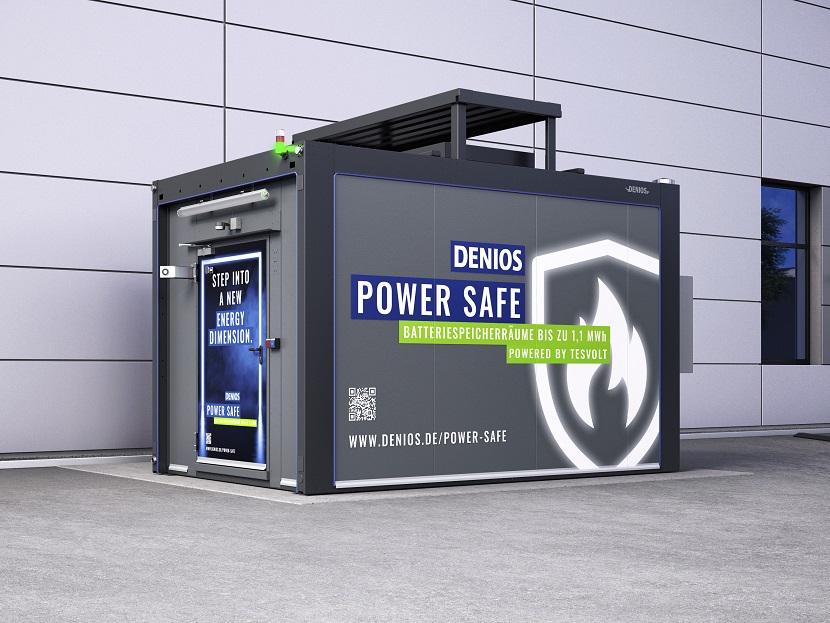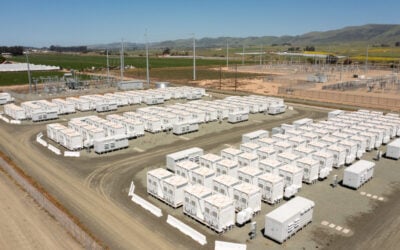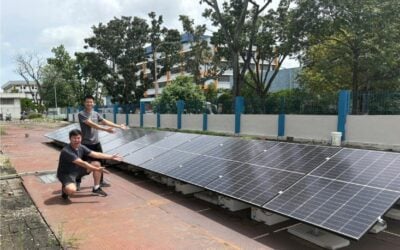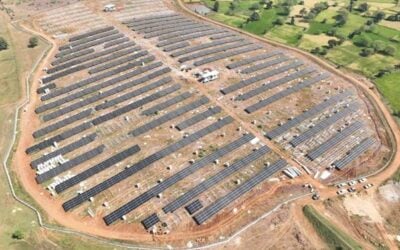
Tesvolt’s new product collaboration with hazardous materials specialist Denios aims to “offer extremely safe energy storage systems to customers with special safety requirements,” the company has said.
German energy storage system manufacturer Tesvolt and Denios have created POWER SAFE, an all-in-one solution that combines battery storage technology with high levels of fire protection.
Enjoy 12 months of exclusive analysis
- Regular insight and analysis of the industry’s biggest developments
- In-depth interviews with the industry’s leading figures
- Annual digital subscription to the PV Tech Power journal
- Discounts on Solar Media’s portfolio of events, in-person and virtual
It is specially designed for installation at challenging sites such as those in water conservation areas or at risk from forest fires, while in some cases, the extra safety could be a requirement of insurers.
Basically, it surrounds the battery energy storage system (BESS) in a “spatial system, similar to a fire protected building,” and the concept came about after the companies worked together on a customer project, Tesvolt product manager Rudolf Frikker told Energy-Storage.news.
The “unique combination” of Tesvolt battery storage systems with the certified spatial enclosure makes it fire safe “from outside as well as from inside for 90 minutes,” Frikker said. The spatial system comes with air conditioning as standard, and customers can add extra features like gas sensors and fire extinguishing equipment.
“The partnership developed when cooperating on another project where Tesvolt has already integrated an energy storage system into a Denios spatial system. We realised that, together, we could offer a solution that has not been available on the market up to now,” Frikker said.
Available for commercial and industrial (C&I) installations from 80kWh up to the multiple megawatt-hour range and based on Tesvolt’s TS HV 30-80E series of BESS solutions, the dual-frame protection offered by Denios’ spatial system is certified to fire safety standards F 90 / REI 90 / REI 120 / REI 60.
Frikker also pointed out that the Tesvolt BESS solutions are also built with safety in mind: in addition to sending complete systems to certification body TÜV Rheinland for testing, the company works with TÜV Rheinland safety experts during the product development phase.
Tesvolt also touted its use of prismatic lithium-ion battery cells, as well as the cell-level voltage monitoring capabilities of its battery management system (BMS), meaning its systems switch to a safe state if any issues arise.
Being certified as fire-safe for up to 90 minutes also means that Tesvolt systems with the Denios protective housing can be installed without a minimum clearance requirement to adjacent buildings, while Tesvolt product manager Rudolf Frikker also claimed the spatial system can be designed to allow for expansion of the storage system size at a later date.
In February, Tesvolt said it would be investing €60 million (US$64 million at the time) into its manufacturing facilities in Saxony-Anhalt, Germany, aiming to reach 4GWh of annual energy storage system production capacity during 2024.
‘Clear need’ for training on safety topics
Denios, as a specialist manufacturing engineering company and consultancy, has a lot of experience with lithium batteries. The Denios “spatial concept” has already been used for “several years” for storing lithium batteries and other hazardous materials, which meant the company’s technologies already obtained the necessary fire safety certifications.
“Multiple fire tests with battery systems have already been carried out in the Denios spatial system,” Rudolf Frikker said, such as a burner being used for 120 minutes on the critical construction elements of the spatial system to get REI 120 certification.
In these tests, “a corresponding measurement temperature must not be exceeded and the flames must not break through during this time,” Frikker said.
Tesvolt has not found that customers are concerned about fire safety so much, but insurers, local fire departments and surveyors often do, and so a solution like this one could be relevant.
Frikker said the company believes current safety standards “are more than sufficient,” although it would be better if safety standards could be consolidated, allowing authorities or insurers to carry out approval procedures for projects more quickly and easily.
Tesvolt did believe however that there is “a lot of half-knowledge” when it comes to safety, and a “clear need for training” among distributors, installers and other stakeholders such as end users.
“Not only installers have to be trained here, but also planners, authorities, fire brigade, basically everyone who designs, plans, installs battery storage systems and those who create tenders,” Rudolf Frikker said.
Fire safety continues to be a major talking point for the battery storage industry, with incidents rare but nonetheless holding the potential to shake confidence in the industry if and when they do happen.
Manufacturers and system integrators now routinely put out press announcements regarding their systems’ certifications and testing. For example, Wärtsilä recently said it has put its grid-scale BESS product, GridSolv Quantum, through a more rigorous testing regime than industry standards require, and Sungrow said last month that it became one of only a small handful of providers certified to supply battery storage systems for New York City.
Read more of Energy-Storage.news’ coverage of fire safety across the industry here.






